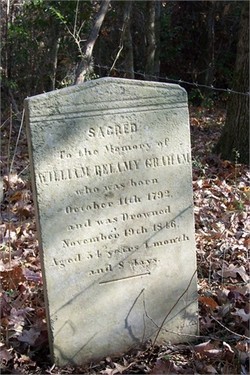HORRY COUNTY SOUTH CAROLINA CENSUS 1830
William B Graham
Males:
1-4-2-0-0-0-1-0-0-0-0-0-0
Females:
1-0-1-0-1-0-0-0-0-0-0-0-0
**1 male (-5); 4 males (5-10); 2 males (10-15); 1 male (40-50)
**1 female (-5); 1 female (10-15); 1 female (20-30)
Although the Graham plantation at its height comprised more than 6500 acres, it was very much a working farm. The plantation house, in which all seventeen children were born, was by no means a mansion. In 1936 Beulah Holly Henderson described it:
``The home of William Bellamy Graham was made of cypress lumber, a large, two-story house with a chimney at each end of the house and a front and back porch. The house is very old, though in good condition, and one of his descendants [the John Hobson Horne family] still lives there. From the front porch we entered a large living room with a fireplace. On the left side of the room is a stairway to the second floor. A door from the living room on the left enters the bedroom of William Bellamy Graham and Jane Conner Graham, where their seventeen children were born. This bedroom also has a fireplace and a hat shelf. Leaving the living room we entered a wide hall with a small bedroom on each side. At the end of the hall is a large dining room, a ´´breezeway´´, then a kitchen. Going upstairs are two large bedrooms with a fireplace in each room. The house was put together with pegs, before there were any nails, and was ceiled with wide lumber ceiling. The kitchen had a fireplace, where the cooking was done, before they had stoves. In the yard was a large sugar maple, also a Mosley tree and a cedar tree.´´
The Grahams owned slaves, though not in the large numbers one might expect for such large land holdings. The largest documented number of slaves was 25. By 1860 this number had dwindled to 15, of whom half were children.
William Bellamy Graham died in 1846 at the age of 54. He and another man had taken a plantation boat and two slaves down the Waccamaw River to Georgetown to purchase plantation supplies. (According to one living family member, the other man was Abraham Jordan Graham, William's brother.) Returning with a heavy load, including a stranger traveling to Virginia, the boat was struck by a quickly formed storm, took on water and capsized. William Graham and the stranger, a Mr. Smith, were drowned. The Winyah Observer recorded the event:
"CASUALTY - Mr. William Bellamy Graham, of Horry, came to town on Thursday last in a four-oared boat to procure some family supplies, and departed again at an early hour on the same evening. The wind was high and the boat so heavily laded the she filled after getting in the bay and immediately capsized. There were five persons in the boat and of the number a stranger by the name of Smith, who was allowed this passage up the Waccamaw, on his way to Richmond, Va.. MR. GRAHAM and MR. SMITH were drowned. The other man and two negroes were saved. Mr. Graham was a very respectable and influential citizen of HORRY, and has left surviving him a wife and seventeen children. Three or four of his sons came down the river on the SABBATH last in search of his body. Our Bay is a dangerous sheet of water in bad weather, and it should not be attempted to be crossed in any other than large and good boats. The annual casualties should be a warning to strangers and all."
Jane Graham was left with fifteen children at home and a large plantation to manage. Family legend gives credit to young Steven Joe, an eighteen year old slave who survived the capsized boat, who assumed a large burden of caring for the plantation and the family. Steven Joe was eventually given to daughter Eliza Caroline, who married John R. Floyd. Uncle Steve, as he was known, took the last name Floyd. Born in slavery in 1828, Uncle Steve died in 1942, just a few days short of his 114th birthday.
The advent of the Civil War brought changes to the Graham plantation. According to Virginia Durant Nettles, Jane Graham proclaimed "I have ten sons in the Confederate Army and wish I had ten more!" She did, indeed have ten sons but George had already died in Texas. The oldest, John Conner, already in his forties, served only in the Marion County Home Guard.29 Samuel Cornelius, however, was killed at Deep Bottom, VA in 1864,30 and Franklin Bellamy was wounded at Clay's Farm, near Petersburg, VA.31 Service records have been located for all the rest, except William Isaiah and Kenneth Asbury.
Jane Graham died in bed in 1862, from an apparent heart attack. She was buried beside her husband in the Old Graham Cemetery. Apparently based on a letter from family in South Carolina, a rumor circulated among family members in Texas that the plantation was ransacked by Sherman's army, and the plantation house and slave quarters were burned. Historical evidence does not support this claim. Sherman's army left Savannah and marched north to Columbia. From Columbia they went further north, then turned the northeast and into North Carolina, coming nowhere near Horry County.32 The house actually stood, more or less continually occupied until it burned in 1967
 Individual Summary:
Individual Summary: Research Notes:
Research Notes: Interesting Stories:
Interesting Stories: Pictures:
Pictures:
